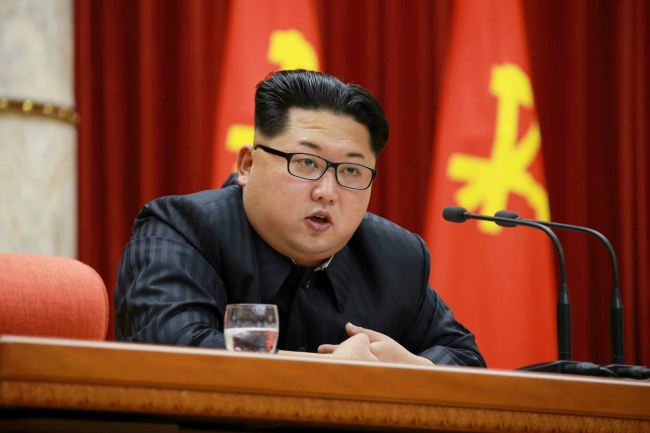North Korean leader Kim Jong-un on Wednesday called for bolstering the country’s nuclear capabilities, threatening an atomic strike should the U.S. stage a “menacing provocation” in response to the recent fourth underground experiment.
Honoring the scientists behind what the North claims to be a hydrogen bomb test, the young ruler accused Washington and its allies of spiraling tension on the peninsula by seeking to slap new sanctions on Pyongyang and deploying strategic weapons here.
“They are bringing fire clouds of an atomic war. … We must strengthen our nuclear armed power further quantitatively so as to carry out a nuclear attack on the imperialist forces led by the U.S. if they encroach upon our sovereignty and commit a menacing provocation,” Kim was quoted by the official Korean Central News Agency as saying at the ceremony in Pyongyang.
“The U.S. and its followers are rushing from every direction with bloodshot eyes to crush our system through vicious economic containment and military pressure.”
 |
| North Korean leader Kim Jong-un speaks during a ceremony awarding scientists for carrying out a “successful” hydrogen bomb test in a photo released by Rodong Shinmun on Wednesday. Yonhap |
The comments mark his first reaction since the U.N. Security Council embarked on the move to impose sanctions on Pyongyang over last Wednesday’s nuclear blast.
With Washington currently drafting a proposal, the body is forecast to adopt a fresh resolution as early as the end of this month, the Voice of America reported, citing a U.S. administration official and a diplomat at the South Korean mission in New York. The UNSC took 18 and 23 days before unveiling the final texts following the North’s second and third tests in 2009 and 2013, respectively.
It also came shortly after the U.S. House of Representatives voted nearly unanimously to pass a bill designed to make way for the administration to levy sanctions on individuals and entities engaging in transactions related to the regime’s nuclear and missile programs, cyberattacks; arms, drug and cash smuggling; human rights violations; purchase of luxury goods; misuse of the global financial system and other illicit activities.
Pointing to the dire living conditions in the communist country, it called on the secretary of state to provide “specific findings with respect to the responsibility for serious human rights abuses and censorship” of Kim and other top military and ruling Workers’ Party officials.
“The Congress seeks, through this legislation, to use nonmilitary means to address this crisis, to provide diplomatic leverage to negotiate necessary changes in North Korea’s conduct, and to ease the suffering of the people of North Korea,” the legislation reads.
The H.R. 757 was introduced in February 2015 by Rep. Ed Royce, chairman of the chamber’s foreign affairs committee, in the wake of the North’s hack on Sony Pictures, but had not been put up for a vote since. The Senate is expected to endorse a similar text.
Following the bill’s passage, the California congressman expressed hopes that the measures would heap pressure on Kim and urged the Barack Obama government to take more active steps against Pyongyang.
“Now is not the time for more of the administration’s ‘strategic patience.’ It’s time for action,” Royce said in a statement. “This bill will help cut off Kim Jong-un’s access to the cash he needs to fund his army, his weapons and the continued repression of the North Korean people.”
In Seoul, the nuclear negotiators of South Korea, the U.S. and Japan gathered later in the day as they speed up policy coordination and sanctions diplomacy with other two members of the six-party denuclearization talks and the UNSC, China and Russia.
Hwang Joon-kook, special representative for Korean Peninsula affairs at Seoul’s Foreign Ministry, hosted Sung Kim, special representative for North Korea policy at the U.S. Department of State, and Kimihiro Ishikane, director general for Asian and Oceanian affairs at Tokyo’s Foreign Ministry.
While Hwang is scheduled for separate talks with his Chinese and Russian counterparts on Thursday and Tuesday, Foreign Minister Yun Byung-se had a phone conversation on Wednesday with Moscow’s Foreign Minister Sergey Lavrov, who also spoke with U.S. Secretary of State John Kerry on Monday.
By Shin Hyon-hee (heeshin@heraldcorp.com)

